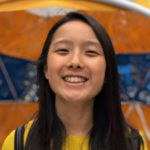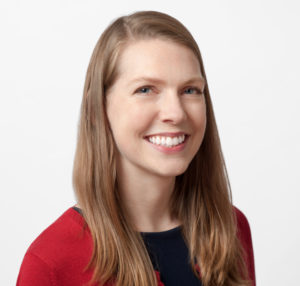
Jamie Chen
Rice University
Houston (29.7° N, 95.3° W)
featuring Carrie Ott-Holland, Manager, Performance Design Research, Google, San Francisco (37.7° N, 122.4° W)
Carrie Ott-Holland is an industrial and organizational (I/O) psychologist who manages a team of researchers redesigning performance  management and promotion processes at Google in San Francisco. She graduated from Rice University in 2009 with a bachelor’s degree in psychology and music. Between 2010 and 2015, she earned a master’s and a doctorate from Michigan State University at the nation’s top I/O psychology graduate program. I had the pleasure of interviewing Dr. Ott-Holland in San Francisco through a video conference while I was across the country in Houston. In the interview, we talked about her unique career path and the two “existential crises” that led her to her current work at Google.
management and promotion processes at Google in San Francisco. She graduated from Rice University in 2009 with a bachelor’s degree in psychology and music. Between 2010 and 2015, she earned a master’s and a doctorate from Michigan State University at the nation’s top I/O psychology graduate program. I had the pleasure of interviewing Dr. Ott-Holland in San Francisco through a video conference while I was across the country in Houston. In the interview, we talked about her unique career path and the two “existential crises” that led her to her current work at Google.
Coming from a preprofessional fine arts boarding high school, Dr. Ott-Holland’s precollege years were focused intensely on classical music and vocal performance. Dr. Ott-Holland came into college as a voice performance major in the prestigious Shepherd School of Music, but soon found herself and her goals to be quite different from her music school peers. Two years into college, when she realized that she did not want to spend every moment of her day studying music, nor did she wish to become a professional opera singer, she had her first “existential crisis.” She realized that she wanted a more diverse college experience with a major that would open her up to a wider array of options after graduation.
With the decision to leave music as a profession, she started to explore various areas of psychology by working as a research assistant in several on-campus research labs. During her senior year, through one of her many research assistantships, she decided that she really enjoyed I/O psychology and wished to pursue a career in the field after graduation. However, she realized that she didn’t have enough time to submit applications to graduate school for the coming fall. This “late” realization, however, became her second “existential crisis.”
When she graduated in 2009, Dr. Ott-Holland decided to spend the next year applying to graduate school while working part-time and taking graduate classes at Rice. However, the economy was in a recession, and Dr. Ott-Holland spent over six months searching for a job. Since she had graduated with a double major from a nationally ranked top 25 university, she had not expected rejection letters from everywhere she applied (including coffee shops). In the meantime, she started cold-calling members of the Houston-area I/O psychology professional association, asking for informational interviews to learn about members’ jobs, their graduate training, and professional advice for young professionals. One I/O psychologist encouraged her to apply for an internship at their company. This exchange resulted in an internship at a personality assessment company, Birkman International. The experience allowed her to gain crucial initial industry experience in the field of organizational psychology.
That year, Dr. Ott-Holland applied to over a dozen I/O psychology graduate programs. She was unsure of her competitiveness as a candidate and wondered whether she would be accepted to any program. To her surprise, she was accepted into Michigan State University, a top I/O psychology program in the country, which served as another crucial stepping-stone in her career.
During graduate school, Dr. Ott-Holland applied and received an offer to do a PhD internship at Google in their People Operations department, which eventually led to a full-time job after her graduation. Dr. Ott-Holland described Google as a company that values data-driven insights and holds a positive attitude towards research. She strongly emphasized the importance of Google’s “science-based HR” mentality for her, as it helped her bridge the gap between her academic training and the realities of corporate life, where purely profit-based business mindsets often drive decision-making.
When asked about advice for students in college without a clear goal or path in mind, Dr. Ott-Holland described a concept borrowed from algorithms that applies to careers—exploration versus exploitation. Although exploring different options is extremely valuable, at some point, when you find something that is good enough, you should just go for it. Both “modes” have their pros and cons. With 100 percent “exploitation” mode, you may reach your goal faster, but you run the risk of realizing your end goal may not be where you want to be, after you have already invested greatly. With 100 percent “exploration” mode, however, you may never decide a path to take and hence never achieve anything. I think this is a practical dilemma (and fear) many young people face today. While there is no clear answer or general rule of thumb, Dr. Ott-Holland’s journey shows that, as undergraduates in college, we still have time to explore and find something we feel interested enough in to want to pursue a career in it. And once you find something you are comfortable with, which balances both practicality and personal interests, you can move along with purpose, and things will slowly fall into place.
Dr. Ott-Holland also had some advice for students on the stress of finding an internship. She recalled, “It’s good to apply to internships, but don’t put too much pressure on yourself early in your career to be remarkable or secure the perfect opportunity. Life is long! Enjoy the opportunity to explore and reflect. The summer after my sophomore year, I worked as an office admin in Rice Village, read books, journaled, went for long runs in my neighborhood, and spent time with friends. Not saying it’s the best thing, but there’s nothing wrong with it.”
